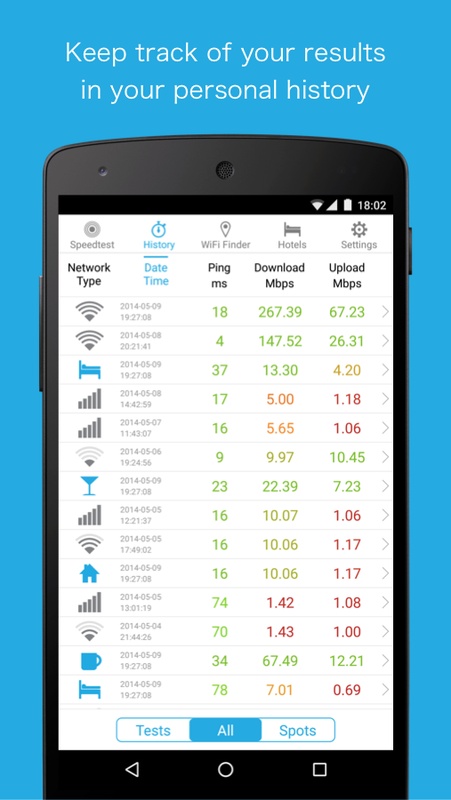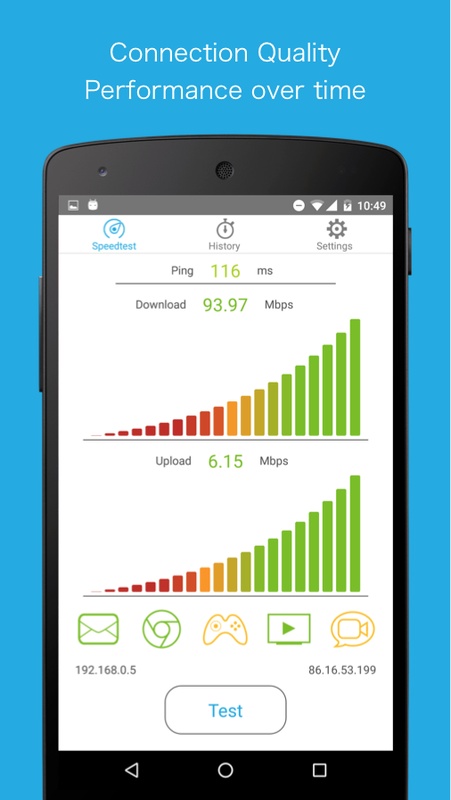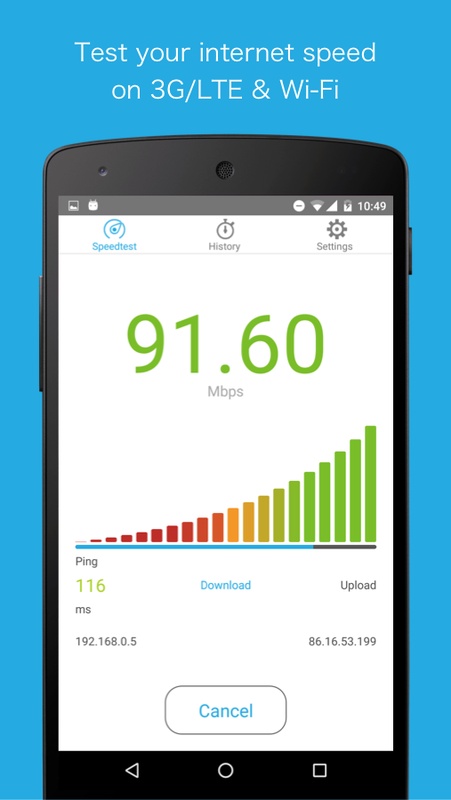Discover the functionality of SpeedTest, an efficient tool crafted to assess your internet connection's speed with ease and precision. Whether you're looking to evaluate your cellular network on 3G, 4G, or LTE, or scrutinize the performance of WiFi hotspots on DSL, ADSL, or cable, this app is designed to cater to your needs. The interface is intuitive, featuring straightforward test illustrations and color-coded results for enhanced clarity, ensuring effortless interpretation of internet capability.
This platform ensures privacy as a priority; unnecessary permissions are not required, allowing users peace of mind. Benefit from a global network of high-speed data servers that work to deliver dependable outcomes. Maintaining a detailed log of test results is simple, recording various metrics such as download and upload speeds, ping, signal strength, and more, along with timestamps and network details.
SpeedTest: Measuring Your Internet Connection
SpeedTest is a widely-used online tool that measures the speed and performance of your internet connection. It provides valuable insights into your network's capabilities and helps identify potential issues.
How SpeedTest Works
SpeedTest operates by sending data packets from a remote server to your device and measuring the time it takes for the packets to make the round trip. This process is repeated multiple times to obtain an accurate average. The tool displays the results in three key metrics:
* Download Speed: The rate at which data can be transferred from the internet to your device, measured in megabits per second (Mbps).
* Upload Speed: The rate at which data can be sent from your device to the internet, also measured in Mbps.
* Latency (Ping): The time it takes for a data packet to travel from your device to the server and back, measured in milliseconds (ms).
Factors Affecting SpeedTest Results
The results of a SpeedTest can be influenced by several factors, including:
* Network Type: Wired connections (e.g., Ethernet) typically provide faster and more stable speeds than wireless connections (e.g., Wi-Fi).
* Internet Service Provider (ISP): Different ISPs offer varying levels of speed and performance, depending on their infrastructure and coverage.
* Time of Day: Internet traffic tends to be heavier during peak hours, which can result in slower speeds.
* Location: Your physical distance from the SpeedTest server can impact latency and overall performance.
* Device Capabilities: The speed and capabilities of your device's network interface card (NIC) can also affect SpeedTest results.
Interpreting SpeedTest Results
The optimal internet speed for your needs depends on your usage patterns and the number of devices connected to your network. For basic web browsing and email, speeds of around 10-25 Mbps download and 5-10 Mbps upload may be sufficient. However, activities such as streaming high-definition video, online gaming, and video conferencing require higher speeds.
Troubleshooting with SpeedTest
If SpeedTest results indicate slower-than-expected speeds, it may be helpful to troubleshoot your network. Check for loose connections, outdated firmware, or potential interference from other devices. If the issue persists, consider contacting your ISP for assistance.
Conclusion
SpeedTest is an invaluable tool for understanding the performance of your internet connection. By measuring download speed, upload speed, and latency, it provides valuable insights that can help you optimize your network and resolve any connectivity issues.
Discover the functionality of SpeedTest, an efficient tool crafted to assess your internet connection's speed with ease and precision. Whether you're looking to evaluate your cellular network on 3G, 4G, or LTE, or scrutinize the performance of WiFi hotspots on DSL, ADSL, or cable, this app is designed to cater to your needs. The interface is intuitive, featuring straightforward test illustrations and color-coded results for enhanced clarity, ensuring effortless interpretation of internet capability.
This platform ensures privacy as a priority; unnecessary permissions are not required, allowing users peace of mind. Benefit from a global network of high-speed data servers that work to deliver dependable outcomes. Maintaining a detailed log of test results is simple, recording various metrics such as download and upload speeds, ping, signal strength, and more, along with timestamps and network details.
SpeedTest: Measuring Your Internet Connection
SpeedTest is a widely-used online tool that measures the speed and performance of your internet connection. It provides valuable insights into your network's capabilities and helps identify potential issues.
How SpeedTest Works
SpeedTest operates by sending data packets from a remote server to your device and measuring the time it takes for the packets to make the round trip. This process is repeated multiple times to obtain an accurate average. The tool displays the results in three key metrics:
* Download Speed: The rate at which data can be transferred from the internet to your device, measured in megabits per second (Mbps).
* Upload Speed: The rate at which data can be sent from your device to the internet, also measured in Mbps.
* Latency (Ping): The time it takes for a data packet to travel from your device to the server and back, measured in milliseconds (ms).
Factors Affecting SpeedTest Results
The results of a SpeedTest can be influenced by several factors, including:
* Network Type: Wired connections (e.g., Ethernet) typically provide faster and more stable speeds than wireless connections (e.g., Wi-Fi).
* Internet Service Provider (ISP): Different ISPs offer varying levels of speed and performance, depending on their infrastructure and coverage.
* Time of Day: Internet traffic tends to be heavier during peak hours, which can result in slower speeds.
* Location: Your physical distance from the SpeedTest server can impact latency and overall performance.
* Device Capabilities: The speed and capabilities of your device's network interface card (NIC) can also affect SpeedTest results.
Interpreting SpeedTest Results
The optimal internet speed for your needs depends on your usage patterns and the number of devices connected to your network. For basic web browsing and email, speeds of around 10-25 Mbps download and 5-10 Mbps upload may be sufficient. However, activities such as streaming high-definition video, online gaming, and video conferencing require higher speeds.
Troubleshooting with SpeedTest
If SpeedTest results indicate slower-than-expected speeds, it may be helpful to troubleshoot your network. Check for loose connections, outdated firmware, or potential interference from other devices. If the issue persists, consider contacting your ISP for assistance.
Conclusion
SpeedTest is an invaluable tool for understanding the performance of your internet connection. By measuring download speed, upload speed, and latency, it provides valuable insights that can help you optimize your network and resolve any connectivity issues.











